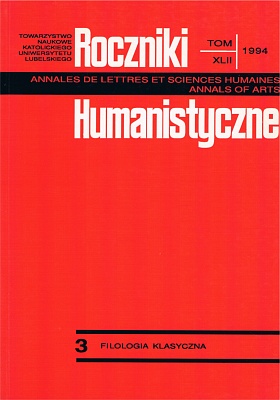Postać Boga w Heroidach Heliusa Eobanusa Hessusa
Abstrakt
Helius Eobanus Hessus' Heroids are one of the many examples of poetry that has the Bible as the subject-matter. Such poetry was very popular in the Renaissance epoch. The main rule of that epoch, ”imitatio antiquorum”, was realized in that poetry in a particular way because at the same time the Bible and the classical literature became models for it. In this particular case the models were first of all the New Testament and Ovid's Heroids. Analysis of the first two letters in the collection (”Deus Pater Mariae Virgini” and ”Maria Virgo Deo Patri”) has shown that the God that is presented there is the Christian God, his picture being consistent with the one shown in the Bible. The anthropomorphization of God found in the poems is not flagrant. The erotic vocabulary in both these letters − used because of the convention typical of the limitated literary genre − also does not exceed the limits of good taste. The author clearly rejects mythology in his presentation of God. However, he uses the ancient patterns in the description of the approaching God's Kingdom, following the description of the golden age in Ovid's Metamorphoses. The Savious who is about to be born, presented in the two letters, is God's Word, he is God himself. In this case the picture of God is consistent both with the Catholic and the Protestant religion. The element of controversy which is so frequently encountered in the literature of that period is absent from the two letters discussed here. The stress is put on conveying certain fundamental religious truths (”docere”). This is achieved by certain stylistic means aiming at moving the adressee as well as the virtual reader; e.g. by emotionally charged rhetorical questions justifying the necessity of Incarnation, or the apostrophe to Satan (”movere”). The literary form imitating the ancient literature serves a third function (”delectare”) which is to attract the reader and arouse his interest. The analysis also shows that the double imitation (of the Bible and of the classical literature) is not an aim in itself. The superior aim is to create a new quality (”aemulatio”) which through its Christian contents, according to Desiderius Erasmus, was to surpass the literary model − Ovid's Heroids.
Copyright (c) 1994 Roczniki Humanistyczne

Utwór dostępny jest na licencji Creative Commons Uznanie autorstwa – Użycie niekomercyjne – Bez utworów zależnych 4.0 Międzynarodowe.





